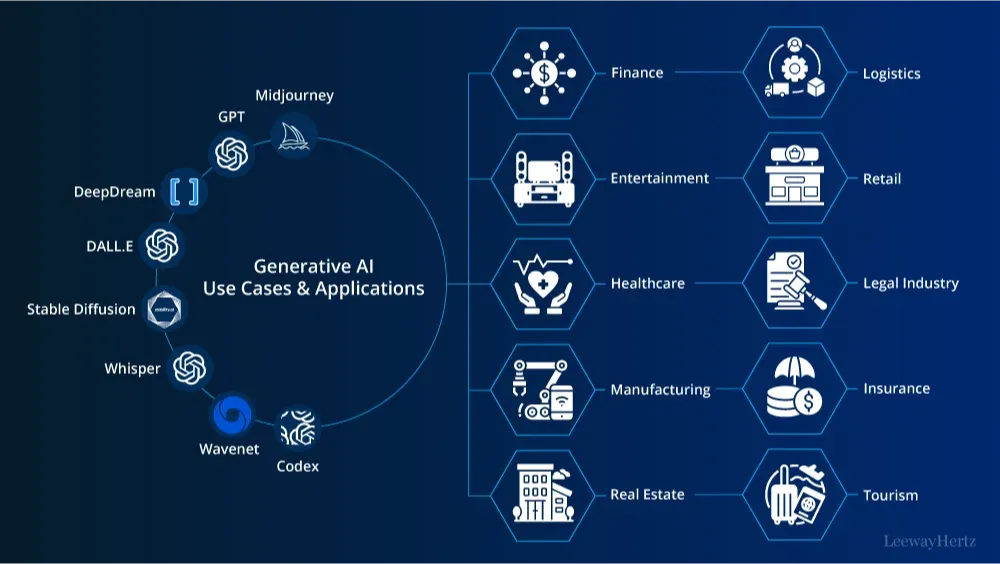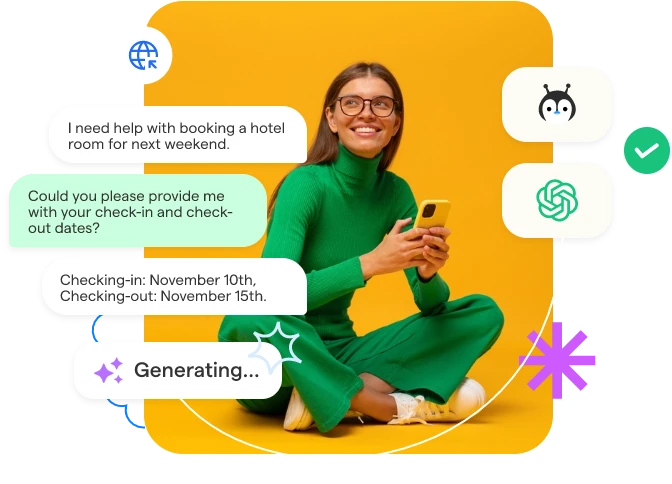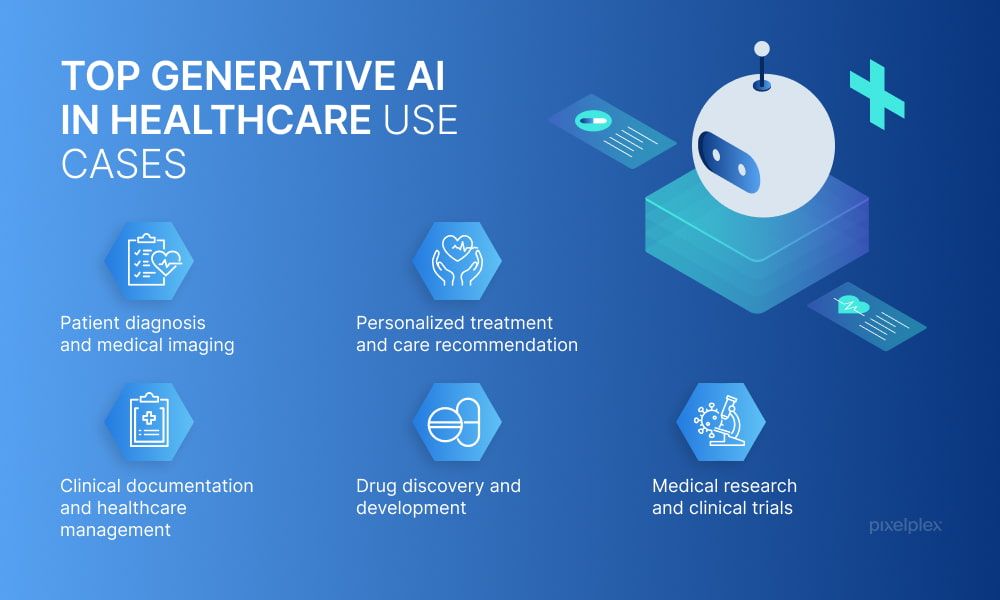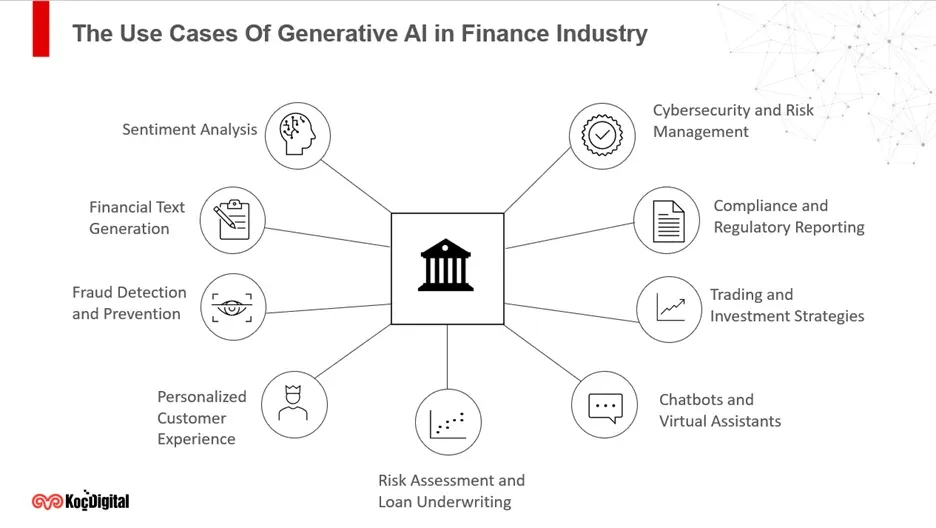Generative AI is reinventing how we create.
This revolutionary technology is already being used in surprising ways across various industries to enhance efficiency, innovation and security.
Learn how AI algorithms compose music, generate art, improve medical diagnoses, and protect data from cyber threats.
This blog post explores 10 intriguing applications of this groundbreaking technology and how it’s transforming businesses.
From boosting creativity to optimizing operations, Generative AI development services opens up endless possibilities.
Whether you’re an artist, investor or healthcare professional, this technology has exciting implications for the future.
Read on to discover generative AI’s vast potential and how it can impact your field. You’ll come away with a deeper understanding of how this technology is changing the world we live in for the better.
Use 1: Content Creation

Artificial Intelligence (AI) has changed content creation, enabling the generation of unique and creative art, music, and writing.
With Generative AI development services, machines are trained to create content that is indistinguishable from human-produced works. This technology has vast implications across industries such as entertainment and marketing.
In the entertainment industry, AI-generated content offers new avenues for creativity. Musicians can utilize AI to compose melodies, harmonies, and even lyrics that resonate with audiences.
Artists can employ generative AI algorithms to produce visually stunning and thought-provoking artwork. This intersection of AI and creativity opens up endless possibilities for innovation and expression.
From a marketing perspective, Generative AI development has the potential to revolutionize content creation for advertising, branding, and social media.
AI-powered algorithms can generate persuasive copy, engaging articles, and compelling visuals. The ability to quickly and consistently create quality content increases efficiency and allows marketers to engage with their audience in unprecedented ways.
Use 2: Chatbots

AI-powered chatbots have become increasingly prevalent in customer service and online interactions. Using Generative AI development, chatbots can provide users with seamless and interactive experiences.
Generative AI allows chatbots to understand and respond to user inquiries in real-time. These conversational agents can simulate human-like conversations, providing prompt and personalized assistance across various platforms, such as websites and messaging apps.
Chatbots developed using Generative AI technology have the potential to transform customer service, saving businesses time and resources by automating responses to common queries.
Furthermore, Generative AI improves chatbots' capabilities by enabling them to adapt to various scenarios and consistently enhance their language and reasoning skills.
The more conversations they have, the more skilled and natural they become at engaging with users, delivering accurate information, and solving problems.
One example of an advanced chatbot utilizing Generative AI is BotPenguin, which can understand complex customer requests and provide tailored solutions. It uses NLP to engage in thoughtful discussions and resolve issues efficiently.
By training on diverse dialogues, BotPenguin can adapt its responses based on context, resulting in more meaningful and human-like interactions.
And that's not it!
BotPenguin allows users to integrate some of the prominent language models like GPT 4, Google PaLM, and Anthropic Claude to create AI-powered chatbots for platforms like:
- WhatsApp Chatbot
- Facebook Chatbot
- WordPress Chatbot
- Telegram Chatbot
- Website Chatbot
- Squarespace Chatbot
- woocommerce Chatbot
- Instagram Chatbot
Use 3: Virtual Personal Assistants
AI-powered virtual personal assistants, such as Siri, Alexa, and Google Assistant, have become an integral part of our daily lives.
Generative AI development services are crucial in these assistants' ability to understand user requests and provide relevant and personalized responses.
Generative AI allows virtual personal assistants to adapt, learn, and improve over time. By analyzing user interactions and continuously updating their algorithms, virtual personal assistants become more effective at anticipating user needs and delivering accurate information in a conversational manner.
These virtual personal assistants can perform various tasks, including setting reminders, answering trivia questions, providing weather updates, making phone calls, and ordering products online.
Integrating Generative AI development services in virtual personal assistants enhances their ability to understand and respond to user queries, making them increasingly valuable in our fast-paced digital world.
Use 4: Augmented Creativity
Generative AI development services have the potential to augment human creativity by acting as a collaborative tool.
Artists, designers, and musicians can use AI algorithms to explore new ideas, push boundaries, and enhance their creative process.
Through Generative AI, creative professionals can input certain criteria, such as style, genre, or mood, and the AI algorithm can generate a range of possibilities.
This collaboration between human imagination and AI capabilities can result in unique and innovative creations that would not have emerged through traditional methods alone.
In design, Generative AI can be utilized to generate diverse design options, optimize layouts, and prototype ideas quickly.
This technology opens up new avenues for innovation and enables designers to explore and iterate on a wider range of possibilities.
Suggested Reading:
Use 5: Medical Research and Diagnosis

Generative AI development services have shown promise in medical research and diagnosis. It can analyze vast amounts of medical data, identify patterns, and make predictions to assist healthcare professionals in diagnosis and treatment planning.
By training AI algorithms on large datasets of patient information, Generative AI can detect anomalies and potential diseases at an early stage. This technology can potentially improve medical outcomes by enhancing accuracy and speed in diagnosis.
Furthermore, Generative AI can aid in drug discovery and development. It can analyze molecular structures, predict the effectiveness of potential drugs, and assist in developing personalized treatment plans for patients.
The use of Generative AI in medical research and diagnosis has the potential to revolutionize healthcare systems, empowering medical professionals with valuable insights and providing patients with accurate and efficient care.
Use 6: Video Game Development
AI has had a significant impact on the gaming industry, enabling developers to create immersive and dynamic gaming experiences.
Generative AI development, in particular, has opened up new avenues for game developers to enhance gameplay, create realistic environments, and improve AI-controlled characters.
Generative AI algorithms can generate realistic landscapes, buildings, and characters, reducing the need for extensive manual design work.
By imitating real-world physics and behavior, AI-controlled characters can exhibit more intelligent and lifelike actions, enhancing gameplay and player immersion.
Additionally, Generative AI development services can dynamically generate personalized game content based on player preferences, play style, and skill level.
This technology ensures that players are consistently challenged and engaged, as the game adapts to their individual needs and abilities.
Generative AI in video game development promotes innovation and opens up possibilities for more interactive, immersive, and personalized gaming experiences.
Use 7: Financial Services

Generative AI has the ability to completely alter the financial services industry by automating procedures, streamlining decision-making, and improving security.
AI systems can process massive volumes of financial data, find trends, and forecast market moves. This study can help investors make data-driven investing decisions, lowering risk and increasing profits.
Generative AI can also automate client onboarding, fraud detection, and credit rating. Financial organizations may use machine learning algorithms to simplify processes, increase efficiency, and improve the customer experience.
Moreover, Generative AI development services can enhance security measures by detecting potential threats and anomalies in real-time. This technology can mitigate risks and protect sensitive financial data from fraudulent activities.
By integrating Generative AI into their operations, financial services can improve decision-making, optimize processes, and deliver a more personalized and secure experience to their clients.
Suggested Reading:
Use 8: Autonomous Vehicles
The development of autonomous vehicles relies heavily on Generative AI. AI algorithms analyze massive amounts of sensor data to make real-time decisions, navigate complex environments, and ensure passenger safety.
Generative AI enables vehicles to learn from their interactions with the environment, improving their ability to anticipate and respond to potential hazards. This technology enhances the accuracy and reliability of autonomous driving systems, increasing passenger trust and acceptance.
Additionally, Generative AI aids in optimizing route planning, traffic prediction, and energy consumption, making autonomous vehicles more efficient and eco-friendly.
The integration of Generative AI in autonomous vehicles has the potential to revolutionize transportation, creating safer and more sustainable mobility options for the future.
Use 9: Language Translation
Language translation has become more efficient and accurate with the help of Generative AI. AI algorithms can analyze large amounts of text data, understand linguistic nuances, and accurately translate between languages.
Generative AI-powered translation systems have the ability to learn from human translations and improve over time. This technology can handle complex sentence structures, idiomatic expressions, and cultural nuances, delivering more accurate and contextually relevant translations.
The use of Generative AI in language translation enables seamless communication on a global scale, breaking down language barriers and facilitating cross-cultural understanding.
Use 10: Cybersecurity
Cybersecurity is a crucial problem in today's increasingly linked society. Generative AI may significantly improve security measures by identifying and preventing cyber attacks.
AI algorithms can scan network traffic, detect anomalies, and proactively guard against future cyber assaults. Generative AI systems may simulate a variety of attack scenarios, enabling security experts to foresee weaknesses and devise effective response tactics.
Furthermore, Generative AI development may help discover and mitigate security breaches by analyzing large volumes of data and finding anomalies in real time. This technology increases the speed and precision of threat detection, lowering the danger of data breaches and illegal access.
The integration of Generative AI in cybersecurity strengthens defense mechanisms, enhances risk mitigation, and helps protect sensitive information from cyber threats.
Conclusion
Generative AI rapidly transforms industries through enhanced efficiency, creativity and security.
This groundbreaking technology already provides real-world benefits across healthcare, finance, transportation, and more.
As highlighted throughout this article, the possibilities are endless. To experience generative AI firsthand, try using with BotPenguin.
This advanced conversational agent understands complex requests and provides tailored solutions using natural language processing.
BotPenguin adapts its human-like responses based on context, resolving issues efficiently. See for yourself how this AI chatbot can augment customer service capabilities.
Sign up now to unlock the power of generative AI with BotPenguin.
Suggested Reading:
Frequently Asked Questions (FAQs)
In what ways is generative AI applied to improve customer experiences in business?
Generative AI development is employed for personalized content recommendations, chatbots, and virtual shopping assistants, elevating customer satisfaction and engagement.
Are there surprising uses of generative AI in the field of architecture and urban planning?
Yes, generative AI development services aids in designing optimal urban layouts, generating architectural blueprints, and optimizing resource utilization for sustainable infrastructure.
How does generative AI contribute to the evolution of virtual reality (VR) and augmented reality (AR) experiences?
Generative AI development enhances VR and AR by creating realistic environments, avatars, and interactive simulations, offering immersive user experiences.
What unexpected ways is generative AI transforming the field of fashion and design?
Generative AI influences fashion design by creating unique patterns, suggesting innovative styles, and even assisting in personalized clothing recommendations, redefining the fashion industry.


